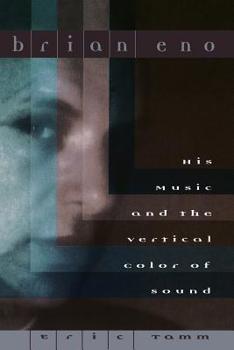Brian Eno: His Music and the Vertical Color of Sound
Select Format
Select Condition 
Book Overview
Musician, composer, producer: Brian Eno is unique in contemporary music. Best known in recent years for producing U2's sensational albums, Eno began his career as a synthesizer player for Roxy Music. He has since released many solo albums, both rock and ambient, written music for film and television soundtracks, and collaborated with David Bowie, David Byrne, Robert Fripp, and classical and experimental composers. His pioneering ambient sound has...
Format:Paperback
Language:English
ISBN:0306806495
ISBN13:9780306806490
Release Date:August 1995
Publisher:Da Capo Press
Length:246 Pages
Weight:0.35 lbs.
Dimensions:0.5" x 5.9" x 8.8"
Customer Reviews
5 ratings
A Rock Musician Discussed Intelligently By A Musical Academic? It's True!
Published by Thriftbooks.com User , 14 years ago
Most of the writing on music that is non-Classical or non-Jazz is done by hacks who just happened to buy enough albums as kids and have enough of a vocabulary to get jobs with music magazines. They possess no real knowledge of music outside of their own highly subjective and fickle opinions. No matter how much they seem to know they are still just fashion designers for the industry. In this case we have a serious "rock" musician taken seriously and analyzed seriously by a serious musicologist. The author demostrates a knowledge of music outside of the pop/rock world and places Eno in this context. Short on biography, long on theory, this is a truly intelligent foray into the music of Brian Eno and is a shining example of what rock journalism could be. Alas, very few examples of "rock" musicians approach Eno in their worthiness of analysis.
Excellent
Published by Thriftbooks.com User , 17 years ago
This book is full of information. Eno's views on music and art are interesting and brilliant. Quotations from Eno himself are in this book in great numbers. If you love Eno's music, read this book. Highly recommended.
If you're interested in Eno, you might want to know...
Published by Thriftbooks.com User , 18 years ago
Sorry, I haven't read it yet. But I thought potential buyers might want to know that this book and the same author's book on Robert Fripp are both available for free download from the author's web site. An act of generosity that certainly deserves five stars.
insightful treatment of the mystique-shrouded Eno
Published by Thriftbooks.com User , 22 years ago
Eno has long since attained quasi-mythical status in hip circles. Considered a, if not The, "Father of Ambient," he is a paragon for the all-black-wearing conceptual art school crowd. What most interests me as a sociologist is how Eno's reputation came about, when, he admits himself, he is responsible for "no breakthroughs" (pp. 172-173), and is more important as an influence than someone whose records many people actually listen to. (For instance, I doubt if too many people in chill rooms at raves listen to Eno -- more likely it's the Orb, or FSOL, or the many others influenced by Terry Riley, Eno and others.) The thing is, I have been around long enough to remember Eno as the androgynous keyboard player for Roxy Music, and so I've seen him move from '70s prog-rock to Father of Ambient. Nice move! It seems to me that his position is based on 2 very different things: 1) fame by association, based on his collaborations and production of Bowie, the Talking Heads and U2, and 2) his late '70s move toward "ambient" on recordings such as MUSIC FOR AIRPORTS and ON LAND. Two crucial influences on Eno are Satie, who started an anti-romantic movement in music, and Cage, who saw himself as an "inventor" in the field of music, with no particular musical aptitude. Eno, likewise, strikes a minimalist posture in opposition to the excess of '70s prog-rock (ie, ELP, Yes), and a cool posture in opposition to the hot, angry punk movement. Anti-heroic and detached. So it seems to me that Eno has managed to succeed in an unusual way by working in the interstices between genres, and by refusing to be pigeonholed by any tendency. He has been in the right place at the right time, for instance, attaching himself to the Talking Heads and thus transitioning from the '70s to the '80s in style, and has known the right people. He keeps moving, keeps experimenting, and maintains tension between multiple positions. For instance, he minimizes emotion compared to much conventional pop, but tries to maintain a "seductive" prettiness (p. 174) compared to the dry formalism of the avant-garde. He's avant-garde, but also a populist! A fascinating element that Tamm reveals is Eno's technical proficiency, and deliberate use of mechanical "glitches" to produce unique sounds. Tamm apparently wrote this originally as a Ph.D thesis -- I wonder how many dissertations there are by now on Eno? At least as edited for DaCapo, it is an excellent work of musical scholarship. In particular, Tamm does a superb job of using direct quotes from Eno to make his main points. If you're at all interested in Eno, Tamm's book is well worth reading.
A good introduction
Published by Thriftbooks.com User , 25 years ago
This book is best for the fan who is also a home recording artist. It tackles Eno primarily in the studio and gives very clear descriptions of his techniques. There is even a glossary in the back. The book deals with his pre-1988 work and was originially a thesis paper so at times reads like one, dry. I enjoy Eno, but this book did nothing to enhance the "myth." Rather it made him human. Not bad, right?




